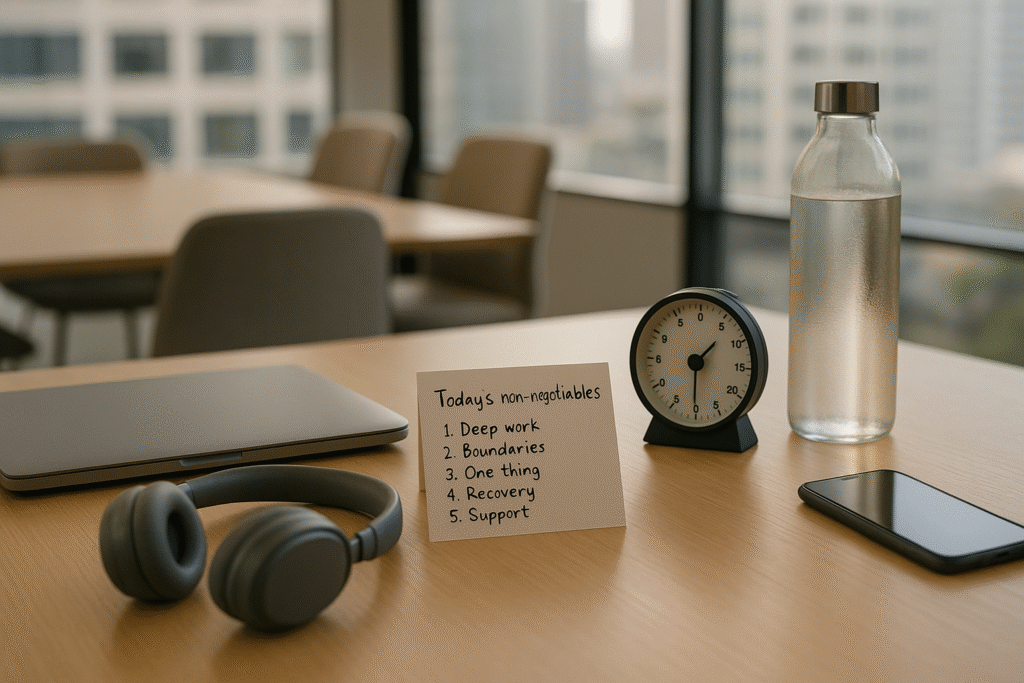When Success Becomes Suffering: Understanding Senior Executive Burnout and Workplace Stress
It’s 11.02PM and Sarah’s phone buzzes again. Another “urgent” email from her team leader in London. She’s been the Chief Operations Officer at a major Eastern Suburbs firm for three years, and lately, the late-night calls have become her new normal. She tells herself she’s just being dedicated. She knows this will be another late night – and tomorrow’s commitments begin very early.
What she doesn’t realize is that she’s drowning.
Sarah isn’t alone. In my practice here at Armchair Psychology in Edgecliff, I see more and more senior executives walking through our doors with the same hollow look in their eyes. They’re successful by every external measure, but inside they’re falling apart.
Why Senior Executives Face Unique Mental Health Challenges
Let’s be honest about something most leadership development programs won’t tell you: the higher you climb, the more isolated you become. Senior executives carry burdens that most people simply can’t understand.
Think about it. When you’re responsible for hundreds of jobs, making decisions that affect entire families, and carrying the weight of quarterly results, where do you turn when you’re struggling? Your board expects strength. Your team needs confidence. Your family wants you – present.
But here’s what I’ve learned from working with countless Sydney executives: vulnerability isn’t weakness. It’s actually the foundation of authentic leadership.
The statistics tell a sobering story. Research shows that 61% of Australian workers experience burnout, but for senior executives, that number jumps even higher. We’re seeing 80% of senior leaders reporting exhaustion levels typical of burnout risk. That’s not just a personal crisis; it’s an organizational emergency.
The Difference Between Stress and Burnout

Many of my clients say things like “I’m just stressed, everyone gets stressed.” But there’s a crucial difference between healthy stress and destructive burnout that too many leaders ignore until it’s almost too late.
Stress is your body’s natural response to challenges. It can actually motivate you and sharpen your focus. Burnout, on the other hand, is what happens when chronic stress overwhelms your ability to cope. It’s characterized by three key elements: emotional exhaustion, cynicism or just negativity about your work or your colleagues, and a sense that you’re ineffective despite working harder than ever.
Physical symptoms include chronic fatigue that doesn’t improve with rest, frequent headaches, disrupted sleep patterns, and a weakened immune system. Emotionally, you might notice increased irritability, feelings of detachment, or a loss of enjoyment in the very work that once excited you.
But here’s what concerns me most as a psychologist: the shame. So many executives believe that admitting they’re struggling somehow disqualifies them from leadership. Nothing could be further from the truth.
Recognizing the Warning Signs
In my years practicing psychology in Sydney’s Eastern Suburbs, I’ve noticed that senior executives often miss the early warning signs because they’re so focused on external performance metrics. Let me share what I watch for:
Are you finding yourself irritated by requests that wouldn’t have bothered you before? Do you feel emotionally numb during meetings that should engage you? Are you struggling to concentrate on complex decisions? These aren’t character flaws; they’re your mind’s way of signaling that something needs to change.
Physical symptoms are equally important. One client recently told me, “I used to bounce out of bed ready to tackle the day. Now I feel tired before I even get up.” That chronic fatigue, combined with frequent illness, headaches, or changes in appetite, often signals that stress has crossed into burnout territory.
The impact ripples beyond the office. Family relationships suffer when work stress follows you home. I often work with couples where one partner’s executive role is creating tension throughout the entire family system. The spouse feels like they’re competing with a job for their partner’s attention, and children sense the chronic tension even when parents try to hide it.
Five Practical Strategies That Actually Work
After years of helping executives reclaim their well-being, I’ve identified strategies that create real, sustainable change. These aren’t generic wellness tips; they’re approaches grounded in psychological research and proven in real-world leadership situations.

Create Non-Negotiable Boundaries
The most successful executives I work with have learned to say no strategically. This doesn’t mean being unresponsive; it means being intentional about where you invest your energy. Say no based on the bigger picture, not personal preferences. Keep your eye on the whole game by identifying your three most important priorities each day and protecting them fiercely. Everything else can wait or be delegated.
Develop Your Emotional Intelligence Network
Isolation kills resilience. Build a small circle of trusted advisors who aren’t afraid to tell you the truth about how you’re doing. This might include a mentor, a coach, or even a peer group of other executives. The key is finding people who understand the pressures you face but aren’t financially dependent on you.
Practice Micro-Recovery Techniques
You don’t need week-long vacations to restore your energy. Research shows that brief, intentional breaks throughout the day can be incredibly effective. This might be five minutes of deep breathing between meetings, a short walk around the block, or simply stepping outside to feel sunlight on your face.
Reframe Your Relationship with Control
Many executives burn out because they try to control everything. But here’s a truth that might surprise you: accepting what you can’t control actually increases your influence over what you can. Focus your energy on your responses, your decisions, and your team development rather than trying to manage every variable.
Invest in Professional Support
The strongest leaders I know have learned to seek help before they’re in crisis. Whether that’s working with an executive coach, seeing a psychologist, or joining a leadership support group, getting an external perspective isn’t a luxury – it’s essential maintenance for anyone in a high-pressure role.
The Ripple Effect of Executive Well-being
What many leaders don’t realize is how profoundly their well-being affects everyone around them. When you’re operating from a place of chronic stress, your team feels it. Your decision-making suffers. Your creativity diminishes.
When you prioritize your own mental health, something remarkable happens. You become more present with your team. Your strategic thinking improves. You model healthy behaviors that give others permission to take care of themselves too.
I’ve seen this transformation countless times in my practice. Executives who address their burnout don’t just feel better personally; they become better leaders. Their teams report higher job satisfaction. Their family relationships improve. Their companies perform better because they’re making decisions from a place of clarity rather than exhaustion.
Taking the First Step
If you’re reading this and recognizing yourself in these descriptions, you’re already ahead of many executives who don’t understand what is happening to them. Acknowledging that you might need support isn’t a sign of weakness; it’s an act of courage and wisdom.
At Armchair Psychology, we understand the unique pressures facing senior executives in Sydney. We know how difficult it can be to find time for self-care when everyone needs something from you. That’s why we offer flexible scheduling and complete confidentiality. No referrals are needed, though Medicare rebates may apply with a GP referral, or your private health cover may contribute to the cost.
The executives who thrive in today’s demanding business environment aren’t the ones who never struggle; they’re the ones who recognize when they need support and have the courage to seek it. Your leadership, your family, and your own well-being are too important to leave to chance.
Ready to reclaim your well-being and become the leader you’re meant to be? Contact Armchair Psychology at our Edgecliff practice. We’re here to help you develop the practical skills you need to manage stress, prevent burnout, and lead with authenticity. Call us today or visit our website to schedule your initial consultation. Your future self will thank you.






















